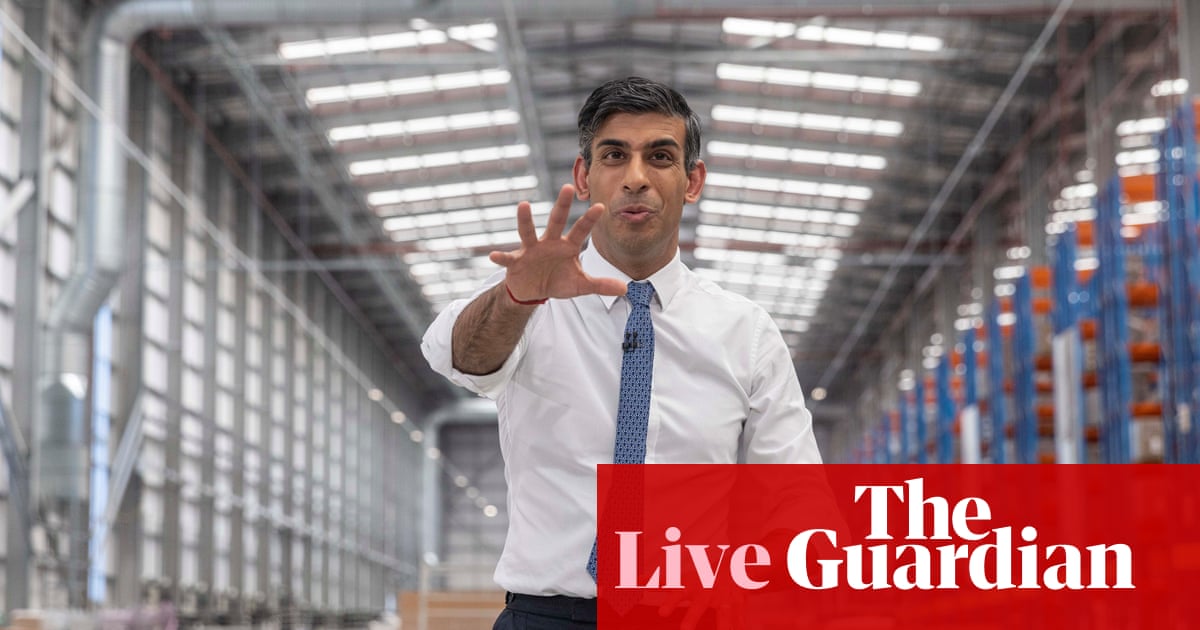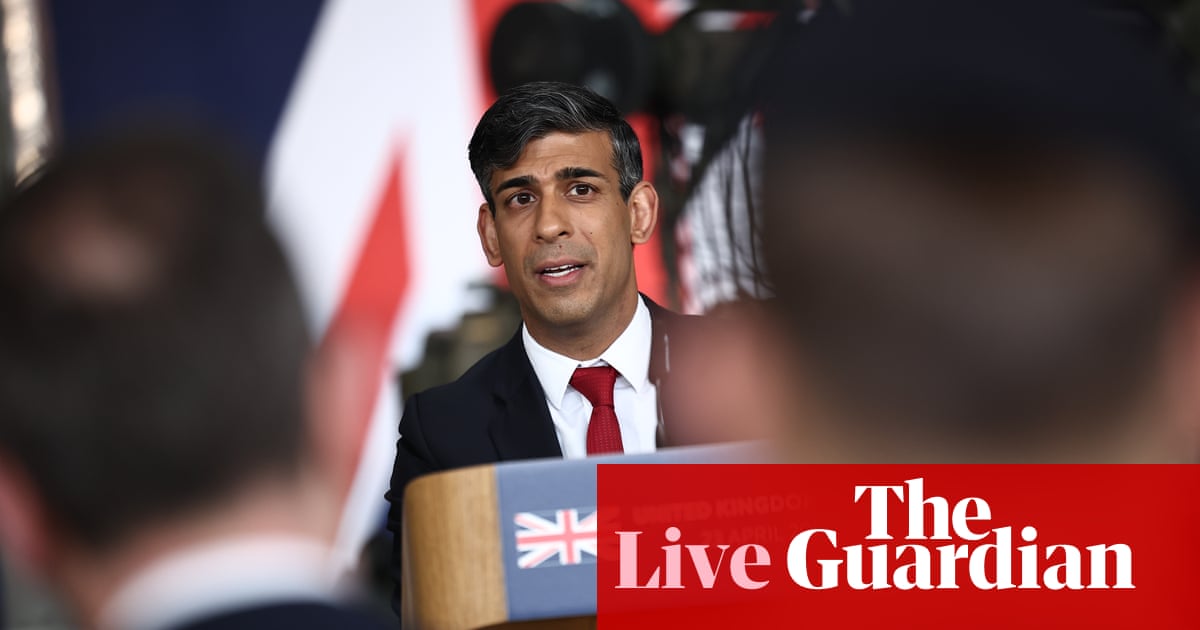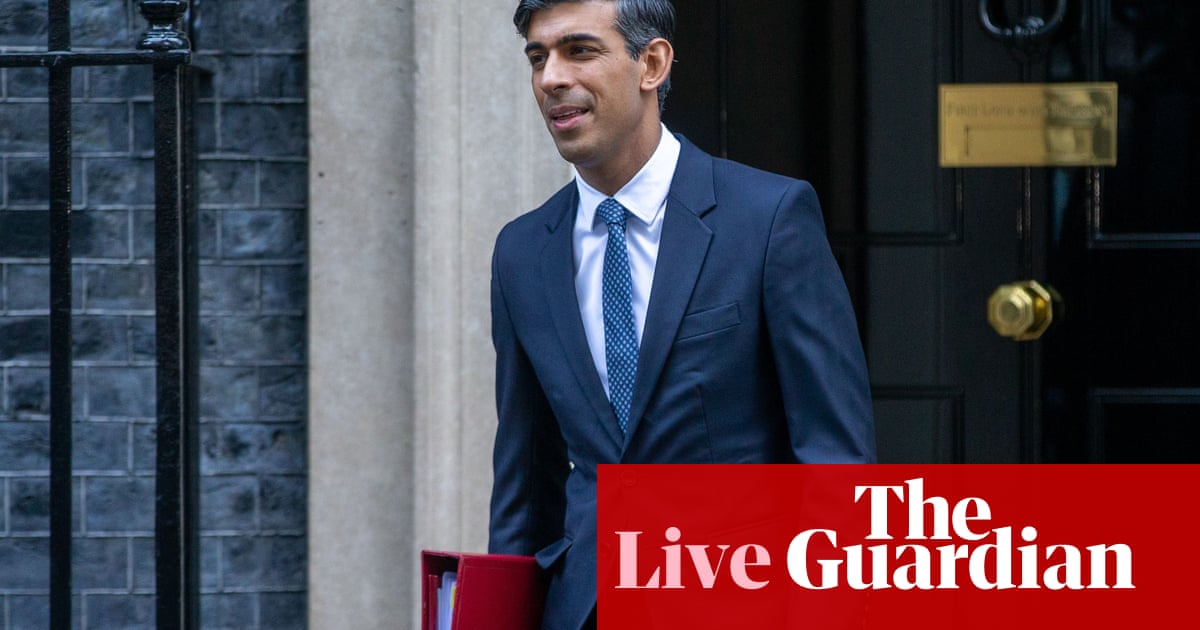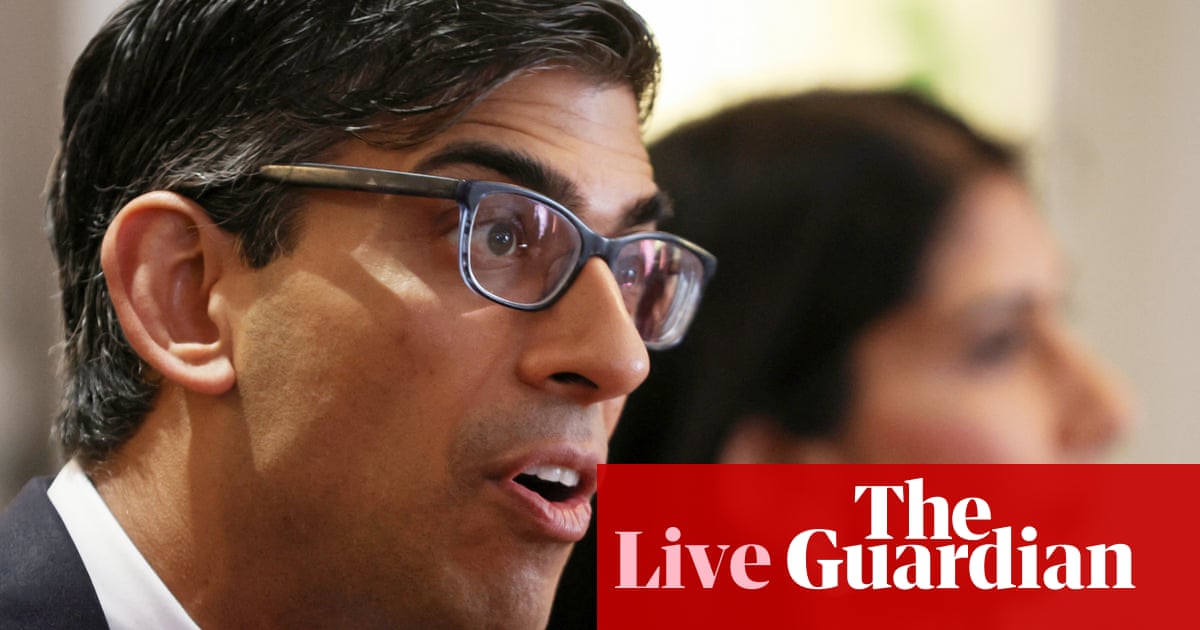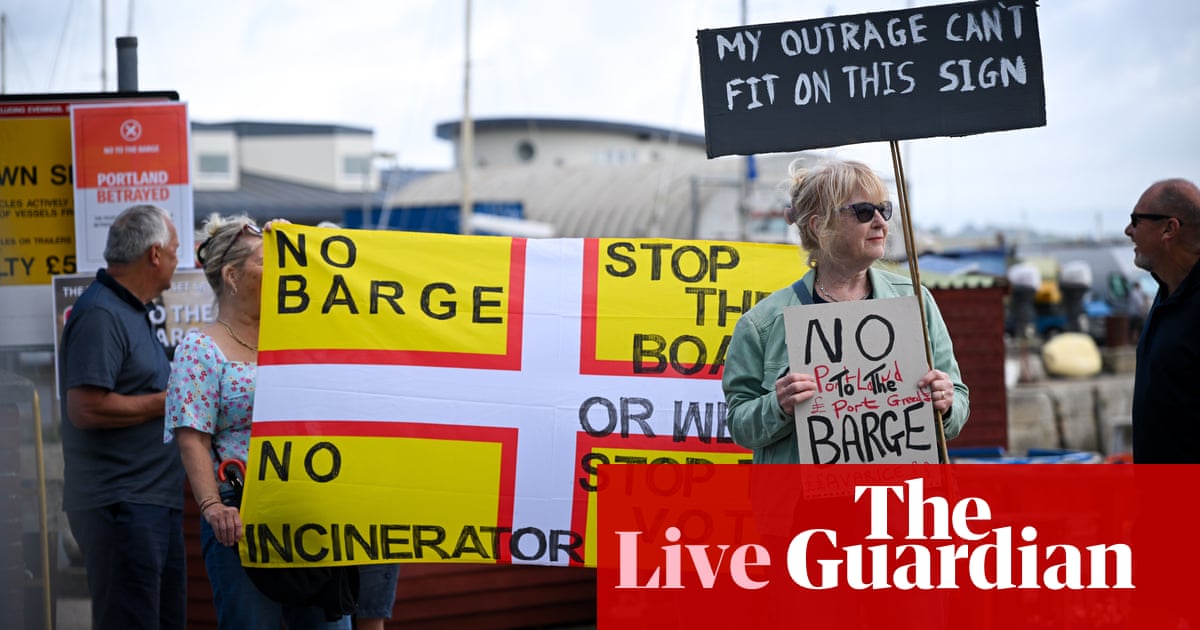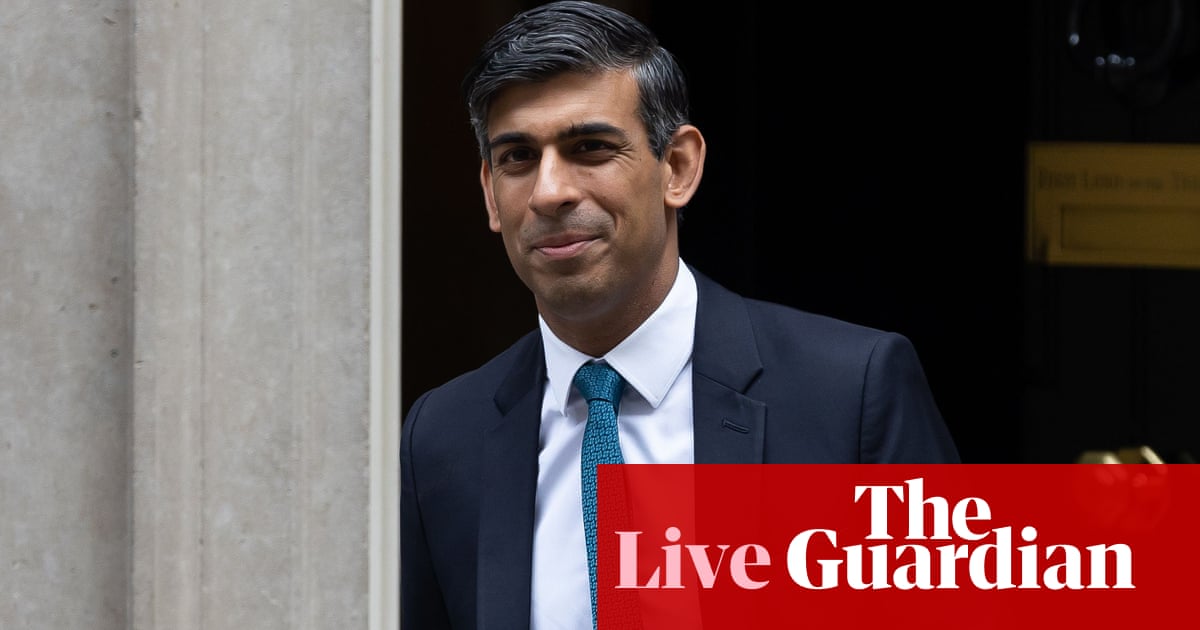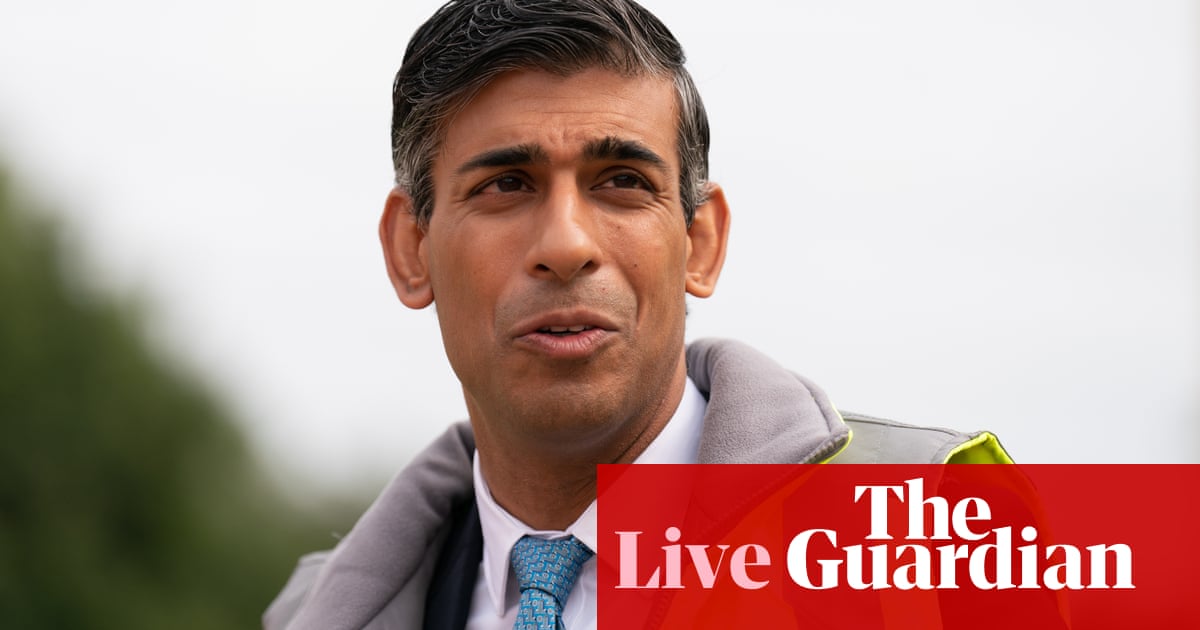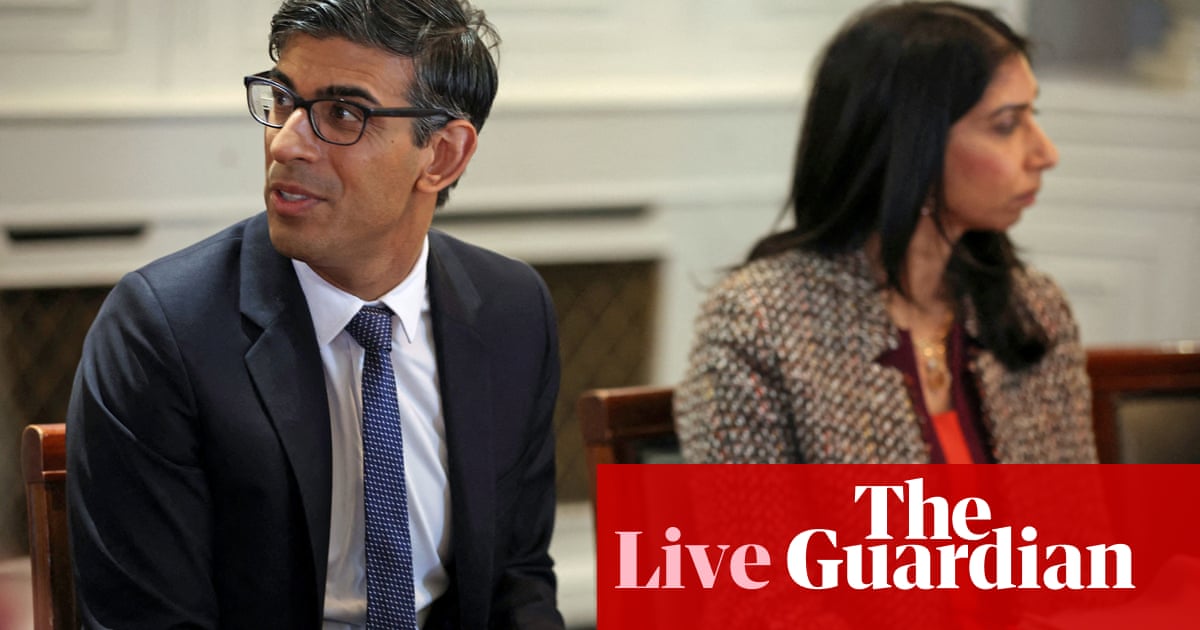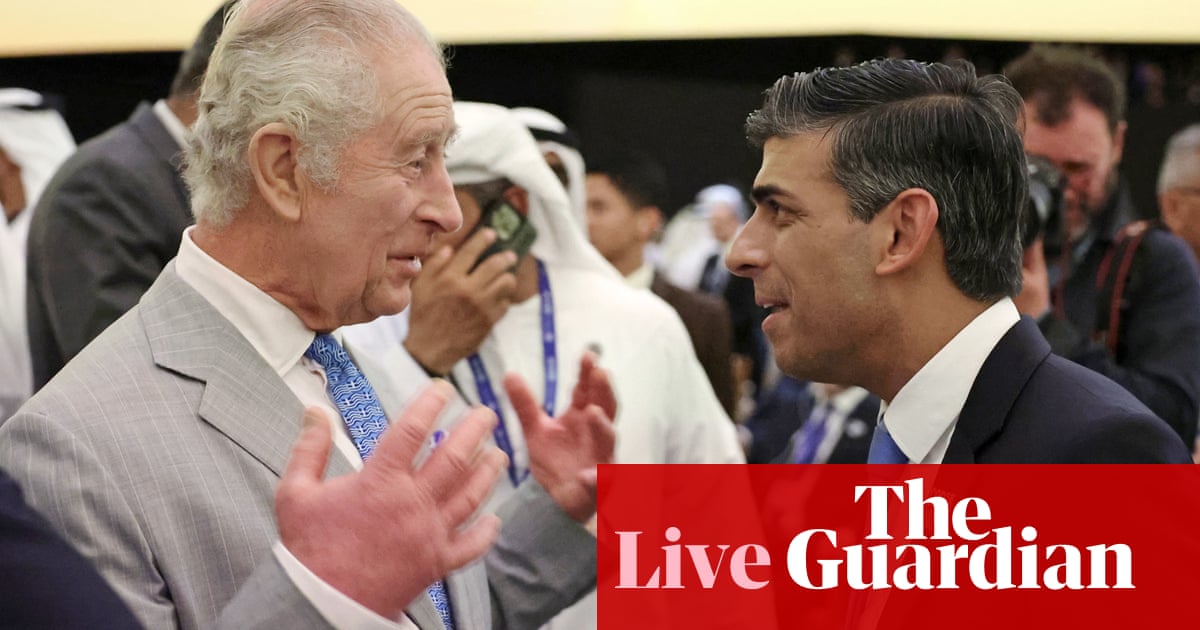
Rishi Sunak: "climate politics is close to breaking point"
Sunak has declared to Cop that he has watered down UK climate policies, potentially embarrassing the country on the world stage.
As other world leaders ask for more action to be taken on the climate emergency, the prime minister continued his environment rhetoric – which has been condemned as damaging by environment charities.
“Climate politics is close to breaking point”, he said, adding that “the costs of inaction are intolerable but we have choices in how we act”.
Sunak said that net zero would only be delivered in a way that “benefits the British people”, adding that “we have scrapped plans on heat pumps and energy efficiency that would have cost people thousands of pounds”.
He also highlighted his new nature plan, which has been panned by critics.
Despite this, he did tell other countries that “the mounting science and evidence of climate related disasters prove we are not moving fast enough”, and added that “everyone can do more”.
He called on major emitters to cut faster and said “the UK is leading the charge”.
End-of-day summary
We are wrapping up the blog. Here is a refresh of a very busy day at the summit:
Keir Starmer, the UK opposition leader, has accused Rishi Sunak of “shrinking and retreating” from showcasing leadership on the global stage at Cop28 and over the climate crisis. Starmer added he he’d had a “lot of engagement” and many requests for bilateral meetings, “more requests than we can possible handle”. He added: “The prime minister said this morning we will be judged by our grandchildren not on what we said but what we did and what we didn’t do. And therefore, for the prime minister to reduce this down in the way that he does, the smallness of his politics is becoming a feature of his politics. We saw it with the Greek prime minister. We saw it with some of the lines that he was putting out about ‘eco zealots’ as he got on the plane to come here. This is not something to shrink from, not something to retreat from.”
Sunak declared to attenders of the summit that he had watered down climate policy in the UK, drawing anger from politicians and climate experts who said he had “misread the room”.
World leaders, particularly those from developing countries at the forefront of the climate crisis, called on large economies and emitters to take urgent action to reduce emissions and fund loss and damage.
A UN report found that droughts were a global emergency causing widespread famine, and that they were a silent, often ignored, killer.
Brazil’s president, Luiz Inácio Lula da Silva, said it was not possible to tackle the climate crisis without also tackling inequality. He spoke of climate suffering in the Amazon, which was experiencing one of the “most tragic droughts in its history”, while cyclones in the south of Brazil had left a trail of “destruction and death”.
Greek people were excited that King Charles wore a Greek-motif tie and pocket square during his address to the conference – signalling – or so it has been interpreted – his support for the return to Athens of the Parthenon marbles after a row over the antiquities this week.
Speaking of the monarch, his speech was certainly more well-received than Sunak’s. Charles said alarming tipping points were being reached and that it was greatly worrying that the world was so far off track in tackling the climate crisis. “Unless we rapidly repair and restore nature’s economy based on harmony and balance, which is our ultimate sustainer, our own economy and survivability will be imperilled,” he added.
The leaders’ speeches are over and I am pretty certain Rishi Sunak is the only one to have used it as an opportunity to boast about domestic climate policy rollback. A less tone-deaf leader may have focused on the positive actions Britain has taken, and urge other countries to follow suit, rather than doubling down on our regressions. In my personal view, it is quite embarrassing and sets a bad example for other countries to follow. Why should poorer countries, which are bearing the brunt of our emissions that are causing extreme weather events, invest in decarbonising when the British prime minister will address Cop of all places to trumpet a retreat from net zero policies? It is a dangerous move to talk about the so-called costs of decarbonisation at a summit where each country is being asked to do its utmost to prevent climate catastrophe.
Below is a summary I wrote in September about Sunak’s net zero rollback to remind you of the policies we are referring to.
Starmer accuses Sunak of ‘retreating’ from climate leadership at Cop28
Keir Starmer has accused Rishi Sunak of “shrinking and retreating” from showcasing leadership on the global stage at Cop28 and over the climate crisis.
This comes after Sunak’s tetchy press conference during which he boasted about UK plans to water down climate action.
Starmer made his comments on the first day of the Cop28 summit, which he attended with the shadow foreign secretary, David Lammy, and the shadow net zero secretary, Ed Miliband.
Starmer said he has had a “lot of engagement” and many requests for bilateral meetings, “more requests than we can possible handle.”
He added: “The prime minister said this morning we will be judged by our grandchildren not on what we said, but what we did and what we didn’t do.
“And therefore, for the prime minister to reduce this down in the way that he does, the smallness of his politics is becoming a feature of his politics. We saw it with the Greek prime minister. We saw it with some of the lines that he was putting out about ‘eco zealots’ as he got on the plane to come here. This is not something to shrink from, not something to retreat from.”
Ed Miliband, Labour’s shadow energy secretary, was not very impressed by Sunak’s remarks to the media in which he reiterated his plans to water down the UK’s domestic climate commitments.
He described Sunak’s stance on the crisis as a “failure”, explaining: “That was a complacent performance from a prime minister in denial about the energy bills crisis at home, and the weakening of the United Kingdom’s standing abroad in his time in office.
“Working people are paying the price for Rishi Sunak’s climate failure, in the form of higher bills, and in the awful costs this leaves our children and grandchildren. His approach, criticised today by a former Tory prime minister, is undermining Britain’s energy security.
“Only Labour can deliver the climate leadership that Britain needs, to cut energy bills for families, make the UK energy independent, and protect the planet.”
UK prime minister Rishi Sunak is on stage at the world leader’s speeches. He said “climate science shows we are off track” and that credibility is being undermined by “climate politics”. This phrase appears to mean, judging by his press conference earlier, criticising him for his net zero rollback.
Sunak criticised the divide between “lofty rhetoric on stages like this” and what happened on the ground. He pointed out that the UK had “decarbonised faster than any other major economy”.
The prime minister again boasted on the world stage that he was “taking a new approach” to net zero and watering down commitments.
He outlined the £1.6bn fund announced today, which will include loss and damage funding as well as support for forests, and said the UK was a leading green finance centre.
Sunak added: “I believe we can deliver here in Dubai but we’ve got to work together.”
The UK PM will not be around to work on the climate negotiations, however, as he is soon due to board his private jet and return to the UK after spending only eight hours in Dubai.
He also said “the debate is too divided”, which may surprise the climate experts he has repeatedly labelled as “zealots” in recent days.
Here are some further extracts from the leaders’ speeches:
The prime minister of Japan, Fumio Kishida, welcomed the summit’s plans to conclude the first ever global stocktake but the world is not yet on pathway to 1.5C. He outlined the country’s financial and energy transition plans, including a goal to make renewable energy its main source of power – Japan is apparently the world’s third largest market for solar power.
Abiy Ahmed, president of Ethiopia, said his country had planted 32.5bn seedlings and was turning a desert into a biodiverse paradise. He said his country is planting climate resilient plants, and produced 6m hectares of wheat in one year. He said “this has relieved us from decades of import dependency” and that they had for the first time become a wheat exporter.
Pedro Sánchez, president of Spain, said we need to have a “polluter pays” principle, where polluters pay for the destruction they cause.
It was pretty difficult for the Dutch prime minister, Mark Rutte, to commit to anything very significant as he has already stepped down as prime minister and his appearance follows a divisive and angry election in the tiny but wealthy country. He contented himself with an exhortation to action, particularly on behalf of the young people around the world, and an acknowledgment that the decarbonisation in the Netherlands has been tricky. “It is a painstaking process but it can be done.” It remains to be seen what the government that succeeds him – still taking shape after the far-right politician Geert Wilders won an unprecedented percentage of the vote – will want to do on this topic.
Unsurprisingly, climate experts are not impressed by Sunak’s decision to use Cop as an excuse to boast about the UK’s back sliding on climate goals.
Tessa Khan, executive director at Uplift, an organisation campaigning for a fossil fuel free UK said: “The prime minister has completely misread the room. While the head of the UN implores countries to urgently phase out fossil fuels, the UK is one of just a handful of wealthy nations that is continuing to greenlight major new oilfields.
“Rishi Sunak’s disinterest in tackling the climate crisis plays badly with voters at home, but to play dumb at Cop and ignore the UK’s role in literally adding fuel to the fire, for example by approving the massive Rosebank oilfield, is diplomatically embarrassing.”
Here are some more updates from the world leaders.
Nikos Christodoulides, president of Cyprus, told the summit that his country was experiencing the effects of climate change – wildfires, floods, and extreme heatwaves which have destroyed large parts of their forests and had a devastating effect on livelihoods. The eastern Mediterranean and Middle East climate change initiative was working on a coordinated response across the region. “Let us come together to build resilient and green businesses and communities of the future.”
Vahagn Khachaturyan, president of Armenia, said it was clear we cannot continue down the route of using predominantly hydrocarbons for energy. He said we need to “phase down” fossil fuels – he didn’t say he wanted to phase them out.
Emmanuel Macron, president of France, went well over his allotted time, delivering a long and comprehensive analysis of the many changes that need to be made to international structures so that action on climate change can be optimised. His speech focused on routes to decarbonisation around the world and pointed out the dysfunction of the investment systems that run them. He called for a complete U-turn on the subject of coal, with the G7 countries must set the example and commit to putting an end to coal. “France will close all plants by 2027,” he promised and the richest countries must help developing countries to phase out coal.
He said the world must also stop subsidising new coal power plants and must change rules when it comes to private financing: “The private sector has no disincentive, and our investment systems are dysfunctional.”
He wanted to see the World Trade Organization redraw its trade rules to allow countries to subsidise green industries and place a tariff on coal.
Asked by the Telegraph about the leaders of the world’s two largest emitters, China and US not attending the Cop, UK prime minister, Rishi Sunak, focused on the UK’s emissions.
“The UK accounts for less than 1% of global emissions. We have to acknowledge in reality that what we do isn’t going to be the difference in terms of our emissions.”
However, many argue that the UK needs to lead by example as a wealthy, developed country which has historically been one of the world’s largest emitters.
Sunak reiterated net zero needs to be “pragmatic and proportionate” because “we only account for less than 1% of emissions”.
Asked by the i about his meeting with Tony Blair, Sunak said “it was nice to see Tony Blair”.
Asked by Politico why he is spending more time on a private jet than at Cop, which he is only going to be at for a matter of hours, he said it is not about the amount of time spent but the impact made.
He said he had very useful meetings with people about a “very significant reform of the global financial system that needs to happen”.
Sunak said: “I feel very good that it’s been a very productive day.”
Now some questions to Sunak from journalists. He was asked by the BBC if he was saying the UK has “already done its bit” and the onus was on other more emitting countries.
He replied that the UK has more ambitious targets than other countries, adding: “We are on track to deliver all these targets, we have carbon budgets that we have met and we are on track to meet the next one as well. With all the announcements I made earlier, we are still on track to meet these carbon targets.”
Sky asked him whether other world leaders had raised concerns about the net zero rollback. Sunak says: “Hand on heart, 100% no. Not a single leader I have spoken to today has, because our targets are more ambitious than theirs.”
He added that other countries are “hugely appreciative” of his work and the UK.
Defending himself, he added: “I shift a date to be in line with almost every other country and it’s treated like it’s a rather extreme measure.”
Rishi Sunak: "climate politics is close to breaking point"
Sunak has declared to Cop that he has watered down UK climate policies, potentially embarrassing the country on the world stage.
As other world leaders ask for more action to be taken on the climate emergency, the prime minister continued his environment rhetoric – which has been condemned as damaging by environment charities.
“Climate politics is close to breaking point”, he said, adding that “the costs of inaction are intolerable but we have choices in how we act”.
Sunak said that net zero would only be delivered in a way that “benefits the British people”, adding that “we have scrapped plans on heat pumps and energy efficiency that would have cost people thousands of pounds”.
He also highlighted his new nature plan, which has been panned by critics.
Despite this, he did tell other countries that “the mounting science and evidence of climate related disasters prove we are not moving fast enough”, and added that “everyone can do more”.
He called on major emitters to cut faster and said “the UK is leading the charge”.




